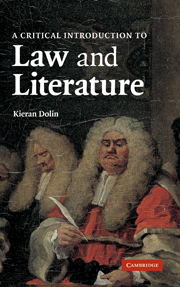Book contents
- Frontmatter
- Contents
- Preface
- Introduction to law and literature: walking the boundary with Robert Frost and the Supreme Court
- PART I EMINENT DOMAINS: THE TEXT OF THE LAW AND THE LAW OF THE TEXT
- PART II LAW AND LITERATURE IN HISTORY
- 3 Renaissance humanism and the new culture of contract
- 4 Crime and punishment in the eighteenth century
- 5 The woman question in Victorian England
- 6 The common law and the ache of modernism
- 7 Rumpole in Africa: law and literature in post-colonial society
- 8 Race and representation in contemporary America
- Conclusion
- Notes
- Bibliography
- Index
6 - The common law and the ache of modernism
Published online by Cambridge University Press: 05 June 2012
- Frontmatter
- Contents
- Preface
- Introduction to law and literature: walking the boundary with Robert Frost and the Supreme Court
- PART I EMINENT DOMAINS: THE TEXT OF THE LAW AND THE LAW OF THE TEXT
- PART II LAW AND LITERATURE IN HISTORY
- 3 Renaissance humanism and the new culture of contract
- 4 Crime and punishment in the eighteenth century
- 5 The woman question in Victorian England
- 6 The common law and the ache of modernism
- 7 Rumpole in Africa: law and literature in post-colonial society
- 8 Race and representation in contemporary America
- Conclusion
- Notes
- Bibliography
- Index
Summary
Modern times find themselves with an immense system of institutions, established facts, accredited dogmas, customs, rules, which have come to them from times not modern. In this system their life has to be carried forward, yet they have a sense that this system is not of their own creation, that it by no means corresponds exactly with the wants of their actual life, that for them, it is customary, not rational. The awakening of this sense is the awakening of the modern spirit.
This chapter is concerned with ‘the awakening of the modern spirit’ in the late nineteenth and early twentieth centuries. It explores the response of lawyers and writers to the growing gap between the traditional normative world of custom and rules on the one hand, and ‘the wants of their actual life’ on the other. Matthew Arnold registered ‘this strange disease of modern life’, in poems like ‘The Scholar-Gypsy’:
'Tis that from change to change their being rolls;
'Tis that repeated shocks, again, again,
Exhaust the energy of strongest souls
And numb the elastic powers.
Arnold saw the rapid changes of modernity as traumatic. Marshall Berman, writing one hundred years later, shared Arnold's sense of ‘the maelstrom of modern life’, but viewed it more ambivalently as ‘an environment that promises us adventure, power, joy, growth, transformation of ourselves and the world – and, at the same time, that threatens to destroy everything we have, everything we know, everything we are’.
- Type
- Chapter
- Information
- A Critical Introduction to Law and Literature , pp. 143 - 165Publisher: Cambridge University PressPrint publication year: 2007



